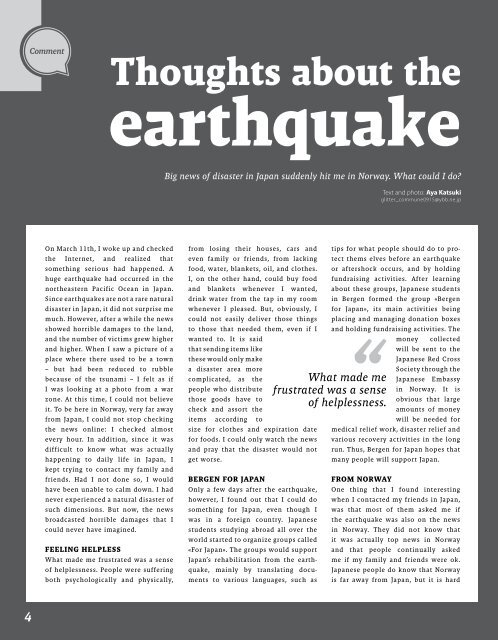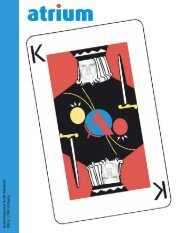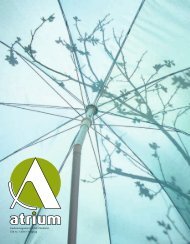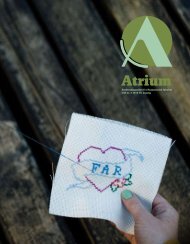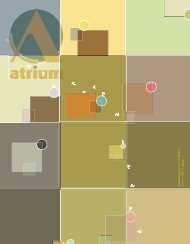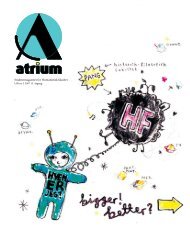Atrium - Universitetet i Bergen
Atrium - Universitetet i Bergen
Atrium - Universitetet i Bergen
You also want an ePaper? Increase the reach of your titles
YUMPU automatically turns print PDFs into web optimized ePapers that Google loves.
Comment-<br />
On March 11th, I woke up and checked<br />
the Internet, and realized that<br />
something serious had happened. A<br />
huge earthquake had occurred in the<br />
northeastern Pacific Ocean in Japan.<br />
Since earthquakes are not a rare natural<br />
disaster in Japan, it did not surprise me<br />
much. However, after a while the news<br />
showed horrible damages to the land,<br />
and the number of victims grew higher<br />
and higher. When I saw a picture of a<br />
place where there used to be a town<br />
– but had been reduced to rubble<br />
because of the tsunami – I felt as if<br />
I was looking at a photo from a war<br />
zone. At this time, I could not believe<br />
it. To be here in Norway, very far away<br />
from Japan, I could not stop checking<br />
the news online: I checked almost<br />
every hour. In addition, since it was<br />
difficult to know what was actually<br />
happening to daily life in Japan, I<br />
kept trying to contact my family and<br />
friends. Had I not done so, I would<br />
have been unable to calm down. I had<br />
never experienced a natural disaster of<br />
such dimensions. But now, the news<br />
broadcasted horrible damages that I<br />
could never have imagined.<br />
Feeling helpless<br />
What made me frustrated was a sense<br />
of helplessness. People were suffering<br />
both psychologically and physically,<br />
Thoughts about the<br />
earthquake<br />
Big news of disaster in Japan suddenly hit me in Norway. What could I do<br />
from losing their houses, cars and<br />
even family or friends, from lacking<br />
food, water, blankets, oil, and clothes.<br />
I, on the other hand, could buy food<br />
and blankets whenever I wanted,<br />
drink water from the tap in my room<br />
whenever I pleased. But, obviously, I<br />
could not easily deliver those things<br />
to those that needed them, even if I<br />
wanted to. It is said<br />
that sending items like<br />
these would only make<br />
a disaster area more<br />
complicated, as the<br />
people who distribute<br />
those goods have to<br />
check and assort the<br />
items according to<br />
size for clothes and expiration date<br />
for foods. I could only watch the news<br />
and pray that the disaster would not<br />
get worse.<br />
<strong>Bergen</strong> for Japan<br />
Only a few days after the earthquake,<br />
however, I found out that I could do<br />
something for Japan, even though I<br />
was in a foreign country. Japanese<br />
students studying abroad all over the<br />
world started to organize groups called<br />
«For Japan». The groups would support<br />
Japan’s rehabilitation from the earthquake,<br />
mainly by translating documents<br />
to various languages, such as<br />
What made me<br />
frustrated was a sense<br />
of helplessness.<br />
Text and photo: Aya Katsuki<br />
glitter_commune0915@ybb.ne.jp<br />
tips for what people should do to protect<br />
thems elves before an earthquake<br />
or aftershock occurs, and by holding<br />
fundraising activities. After learning<br />
about these groups, Japanese students<br />
in <strong>Bergen</strong> formed the group «<strong>Bergen</strong><br />
for Japan», its main activities being<br />
placing and managing donation boxes<br />
and holding fundraising activities. The<br />
money collected<br />
will be sent to the<br />
Japanese Red Cross<br />
Society through the<br />
Japanese Embassy<br />
in Norway. It is<br />
obvious that large<br />
amounts of money<br />
will be needed for<br />
medical relief work, disaster relief and<br />
various recovery activities in the long<br />
run. Thus, <strong>Bergen</strong> for Japan hopes that<br />
many people will support Japan.<br />
From Norway<br />
One thing that I found interesting<br />
when I contacted my friends in Japan,<br />
was that most of them asked me if<br />
the earthquake was also on the news<br />
in Norway. They did not know that<br />
it was actually top news in Norway<br />
and that people continually asked<br />
me if my family and friends were ok.<br />
Japanese people do know that Norway<br />
is far away from Japan, but it is hard<br />
to know to what extent people in<br />
faraway countries would react to the<br />
news. Therefore, I am sure that people<br />
will be happy to know that people in<br />
other countries are caring and trying to<br />
help Japan. Those supporting can help<br />
people both practically and by showing<br />
empathy and support. Though, in fact,<br />
I am already feeling<br />
so much kindness<br />
from people in<br />
Norway these days.<br />
There were many<br />
who cared about my<br />
family and friends in<br />
Japan right after the<br />
earthquake. Besides<br />
that, the newspaper<br />
interviewed us and posted an article<br />
about Japanese students in <strong>Bergen</strong> and<br />
University held meetings for Japanese<br />
students and Japan.<br />
First fundraising activity<br />
The major event was our first fundraising<br />
activity in the city center. There<br />
were lots of people out enjoying the<br />
beautiful weather during the weekend.<br />
Though we were holding handmade<br />
donation boxes and posters, there were<br />
only about 10 Japanese students who<br />
were standing there trying to collect<br />
money. When we just stood there, it<br />
was hard for people to see what we<br />
were doing. So we yelled for support in<br />
Japanese, English and Norwegian. None<br />
of us had done this kind of thing in a<br />
foreign country before, so we were both<br />
nervous and embarrassed. But after<br />
we started to use our voices, people<br />
gradually came up to us to donate or<br />
to talk. Various people, such as small<br />
children, teenagers and elderly people<br />
stopped by and donated money.<br />
We gave a folded paper crane to<br />
everyone who donated. In Japan, people<br />
fold cranes, especially 1000 cranes, and<br />
send to patients with wishes of recovery<br />
from disease and longevity. One of the<br />
reasons behind this custom is an idiom<br />
that says that «Cranes live for 1000<br />
years, turtles live for 10.000 years.» The<br />
general idea is that when someone is<br />
sick or has passed away, people worry<br />
or think about them so much. But<br />
people cannot do anything, so at least<br />
they want to convey their feelings to<br />
them. Thus, people fold paper cranes to<br />
show that they are thinking about them.<br />
What made us able to enjoy this activity<br />
was people’s<br />
smile when they<br />
got a folded paper<br />
crane. Especially,<br />
children looked<br />
so happy when<br />
they got it and<br />
that made us also<br />
smile. It was a nice<br />
experience to communicate<br />
with local people, who we do<br />
not usually talk to. With people’s attention<br />
and cooperation, we could work<br />
hard. By March 26th, we had collected<br />
I am already feeling so<br />
much kindness from<br />
people in Norway<br />
these days.<br />
about 17,000 NOK. We hope we can<br />
continue this activity with cooperation<br />
and kindness of people in Norway.<br />
<strong>Bergen</strong> for Japan<br />
Japanese students worked with fund raising for the Japanese Red Cross. From the left: Xin<br />
Wen, Yasuaki Yamano, Asuka Takeda, Masaaki Takahashi.


